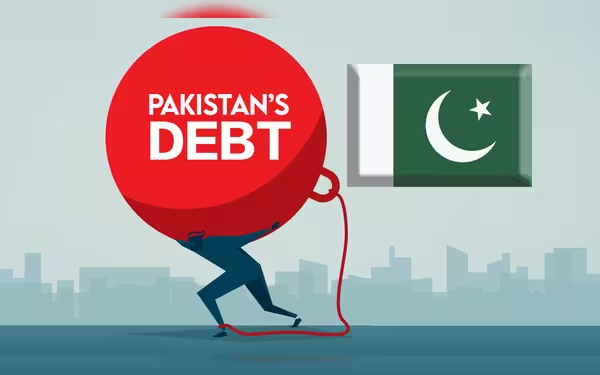Tuesday, July 2, 2024 03:09 PM
Pakistan's Debt Surges, Raising Financial Stability Concerns
- Rs276.55 billion added to Pakistan's debt in a week
- Debt breakdown: budgetary assistance, commodity transactions, miscellaneous expenditures
- Rising debt levels in Pakistan prompt financial stability worries
 Image Credits: thecurrentpk
Image Credits: thecurrentpkThe government of Pakistan adds Rs276.55 billion to its debt, reaching Rs4.78 trillion for the fiscal year. Rising debt levels raise concerns about financial stability.
As of the week ending April 26, 2024, the government of Pakistan has added Rs276.55 billion to its existing debt, bringing the total net debt for the current fiscal year to a significant Rs4.78 trillion. This continuous increase in borrowing, as reported by the State Bank of Pakistan, highlights a concerning trend that has been observed in recent years.
The government's borrowings are categorized into three main areas: budgetary assistance, commodity transactions, and other miscellaneous expenditures. These divisions help in better understanding how the borrowed funds are allocated and utilized for different purposes.
Understanding the Debt Breakdown
1. Budgetary Assistance: This category includes funds borrowed to support government spending on essential services such as healthcare, education, and infrastructure development.
2. Commodity Transactions: These borrowings are related to trading activities involving commodities like oil, gas, and agricultural products.
3. Other Miscellaneous Expenditures: This segment covers any additional borrowing that does not fall under the above two categories, which could include emergency expenses or debt refinancing.
Implications of Increasing Debt
The steady rise in Pakistan's debt levels raises concerns about the country's financial stability and ability to manage its debt obligations in the long run. It is crucial for the government to carefully monitor and control its borrowing to avoid potential economic challenges in the future.
Conclusion
As Pakistan continues to accumulate debt at a rapid pace, it is essential for policymakers to implement effective strategies to manage and reduce the country's debt burden. By promoting fiscal responsibility and exploring sustainable financial practices, Pakistan can work towards a more stable economic future.













